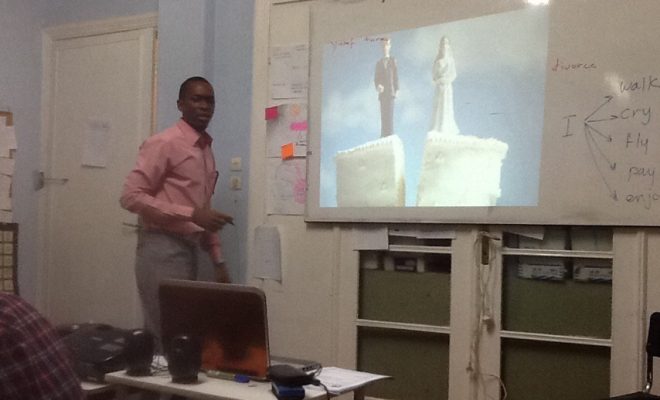CELTA and technology – with or without it?

**The Edvocate is pleased to publish guest posts as way to fuel important conversations surrounding P-20 education in America. The opinions contained within guest posts are those of the authors and do not necessarily reflect the official opinion of The Edvocate or Dr. Matthew Lynch.**
A guest post by Marisa Constantinides
In a recent end-of-course evaluation report, one of our CELTA candidates suggested (complained is perhaps a better word) that her expectations of a higher grade on the CELTA course were not fulfilled because she did not know how to use technology. Had she not been encouraged to use it (by her tutor), she said, she would have achieved a higher grade. It was the effort she put into including tech in her lessons that which cost her this higher grade.
For this trainee (now teacher), learning to use simple tools such as powerpoint, projecting images and slides on the data projector, or showing a You Tube video in her lessons, was perceived to be a task which took up so much effort, that her performance suffered and so the highly desired Pass A or B was not achieved.
Learning to…
- plan lessons
- design handouts
- create role cards
- design information gaps or games
- specify lesson aims
- achieve lesson aims
- find and adapt suitable activities
- etc etc.
….these were not perceived as difficult or as demanding as plugging in the data projector and hooking it to your laptop to project a simple word handout or powerpoint.
All these things were perceived as normal but knowing how to use a few simple tools like those mentioned above, or a word cloud was not.
In fact, using technology was perceived as not only unnecessary, but as a block to achieving the learning of all these complex tasks, an added pain even which put a stop to that trainee’s progress.
Blocks to technology
Typically, those who resist technology and express similar views are older candidates who have some or a lot of experience of chalk and talk (or board marker and talk, if you like). Some younger candidates though can also be staunch resisters. Our philosophy of teaching and educational values often comes from being a learner and many of these teachers come from a highly teacher-centred educational framework of chalk and talk, of grammar translation, of teachers untrained and uneducated in terms of pedagogy studies.
Educational values are unconsciously acquired, even if our conscious mind never found any pleasure in learning in such situations.
One of these trainees even went as far as to tell us that we should be warning people on our website that obtaining the CELTA involves knowledge of technology (it doesn’t). Knowing how to use Word and Powerpoint is not real tech or part of a teacher’s 21st century skills toolkit.
No one asked us to issue warnings about the fact that that learning teaching involves knowledge of pedagogy or that lesson plans take time to learn to do properly.
So why is it that some people think they actually can put us to task for not having warned them about the use of educational technology?
Surely, pedagogy is much more complex as a field than knowing how to use some simple apps or tools,
but there you have it in a nutshell: using technology raises the hackles of some people.
We tend to call such people technophobes and may be we have all gone through a stage like this at some point in our lives.
But we managed to overcome our fear; some of us even jumped right in without any fear even but with excitement about the new learning opportunities and the chance to do an even better job.
This is not to say that we do not acknowledge the learning effort though we do wonder when it raises such obstacles and such strong emotions.
Without Technology?
Of course we have seen (and still see and teach) some absolutely wonderful lessons which did not use any of the latest technology or apps, not even a powerpoint or typed and colour printed handouts! I have some such lesson plans in storage and keep them in awe of the artwork that has gone into them
But the professional effect achieved took the trainee teacher numerous hours of hand-drawn artwork – such as all of us have done at one time or another.
I have drawn numerous flashcards myself and still remember the time that went into creating them. And I do also remember the pleasure I got out of doing them. So may be some people do get their kicks out of creating their own hand -crafted materials and that is fantastic. There is no reason to stop doing that if you have the time and the will to do it.
Does technology stop us from doing that? Of course not! But when we don’t have the time to indulge in such pleasurable handiwork for our classes, it’s there to help us produce professional and neat looking materials that will also be visually pleasant and memorable for our learners.
Incidentally, would this trainee complain had she had to do handwritten and hand-drawn materials and handouts? Would she have then blamed the lack of technology for her grade? I am curious.
With or without?
Saying swimming sucks because you can’t float is not just narrow minded, it’s also not very clever. But phobias of this or that – technology in our case – are not always backed up by intelligent reasoning; they exist because of the strong emotions they generate in individuals, their lack of self-esteem and the blocks they themselves have created which say things like “I am not good/clever/old enough to learn how to use this technology because it would take me forever” or “I can’t be bothered to learn this technology because it might make me look incompetent or I would rather not spend time learning it”.
Technology, after all, is just a range of additional tools but it is not the answer to every teaching or learning problem.
Ignoring it or resisting it, however, will not be an option for long; teachers who cannot use it will eventually be phased out by teachers who do use it as it provides us with numerous learning tools that go far beyond a nice looking image, so resisting learning about or using what is available limits learning opportunities for our learners.
It’s not just there to replace images; this is just one function!
More importantly, the decision to use or not to use technology is one that you can only make if/when you can use it, not when you can’t!
As I write these lines in the year 2015, I am thinking of all the impassioned discussions between technophiles and self-proclaimed luddites back in 2009 and 2010. You might not think that 5 years is not a long time but, actually, in tech and web culture terms, it is!
I didn’t think such attitudes would still be going strong today but, there you have it; the same issues need to be addressed and re-articulated in new ways, to catch the latest batch of digital resisters.
With Technology but for a good reason
The Cambridge syllabus stipulates that courses should include:
The selection, adaptation and evaluation of materials and resources in planning (including computer and other technology based resources) (4.4)
Technology has been a part of the syllabus for a long time, although it is true that many centres still opt not to train their candidates in its uses for the same reasons that trainees resist it: ignorance, lack of confidence, lack of conviction in its educational value and just plain shirking one’s duty as a trainer – in the same way that some teachers shirk their duty as teachers.
I feel this an opportunity lost for ever – given the funds, effort and energy one puts into this qualification, surely, they would want to be taught all the required components of their syllabus!
This could go round in circles for ever. I think I will just close with a great aphorism – widely quoted but of uncertain origin – which epitomises the spirit of this post as well as why we believe in making educational uses of technology an integral part of all our teacher courses – including the CELTA.
Technology won’t replace teachers, but teachers who use technology will probably replace teachers who don’t.
It’s inevitable and we cannot go back. We can choose to have lessons or activities without tech but this, also, must be a considered option not a random decision or a non-decision.
This post originally appeared on marisaconstantinides.edublogs.org, and was republished with permission.
Read all of our posts about EdTech and Innovation by clicking here.
____________________
Marisa Constantinides runs CELT Athens, a Teacher Development centre based in the capital of Greece, and is a Course Supervisor for all courses, including the DELTA Cambridge/RSA Diploma, the Institute of Linguists Diploma in Translation and off-site seminars and workshops on a variety of topics.






